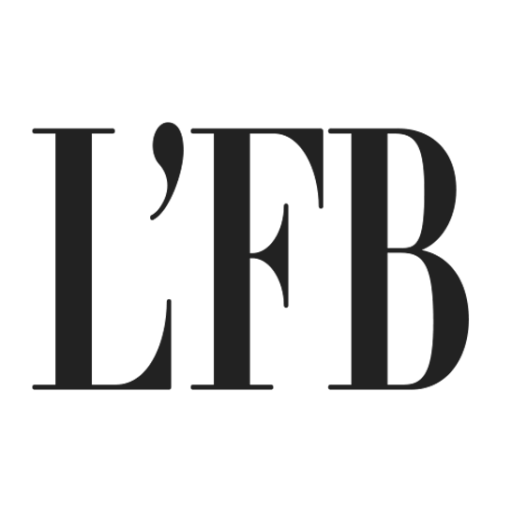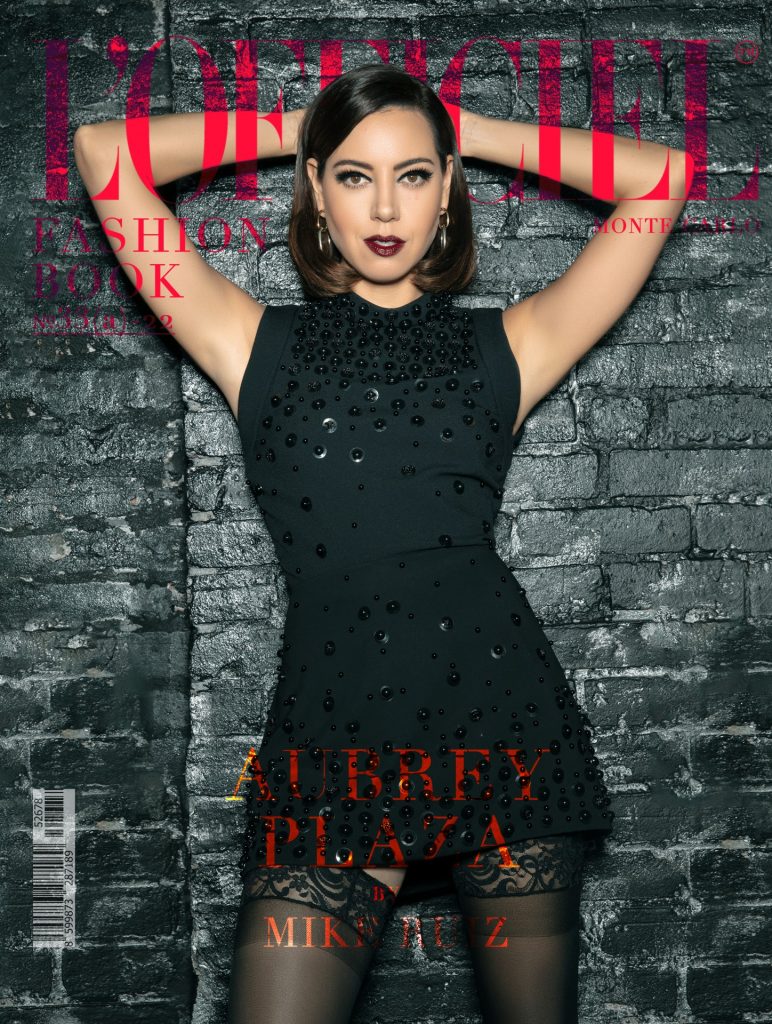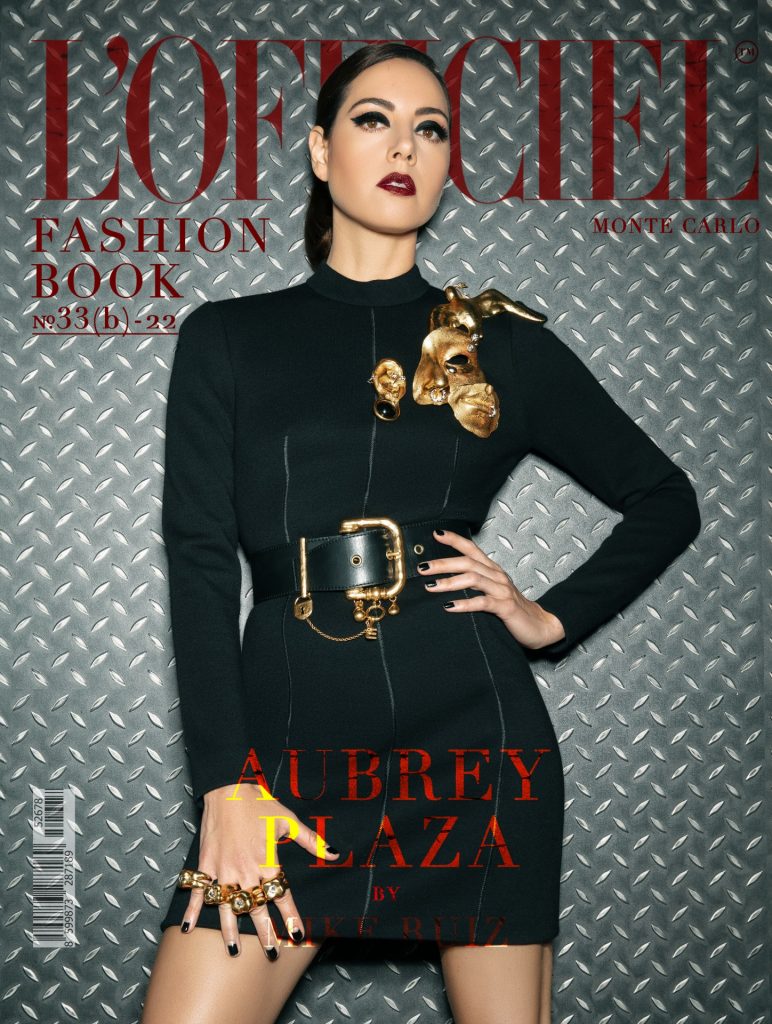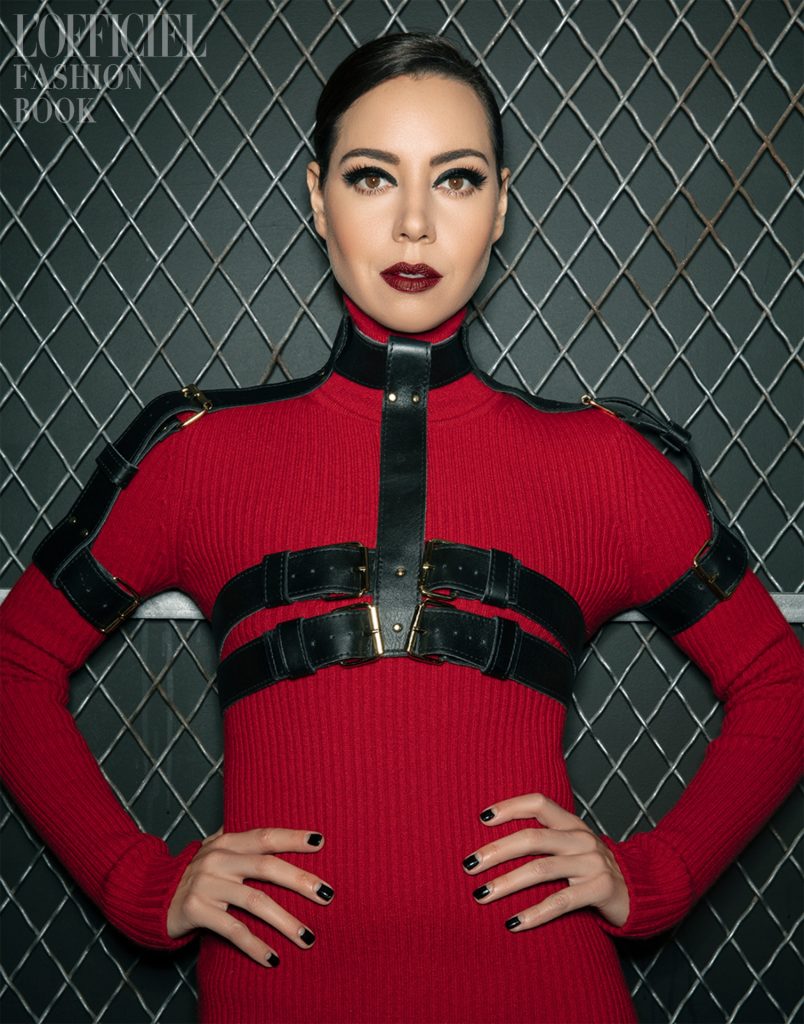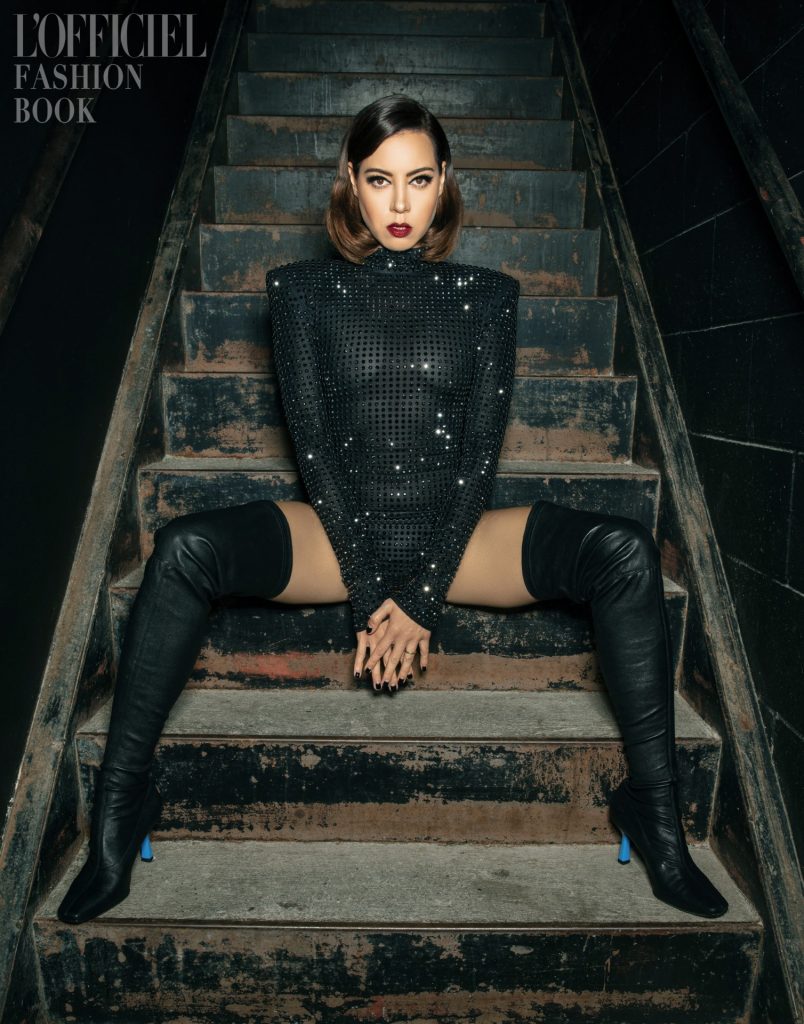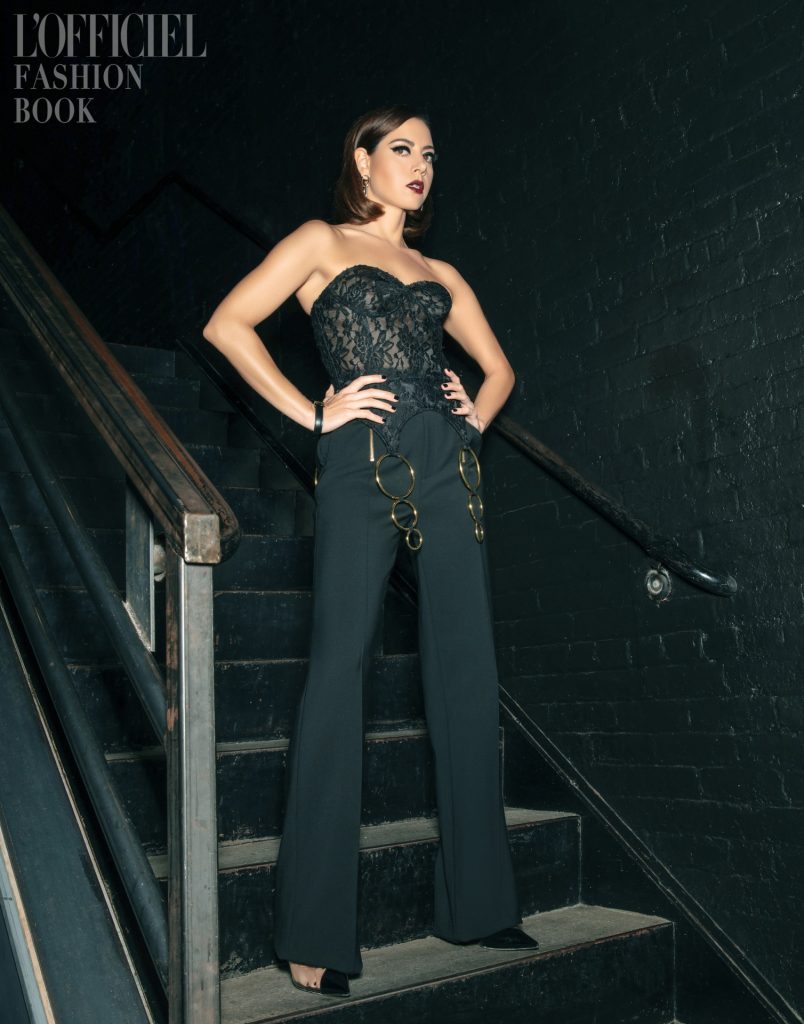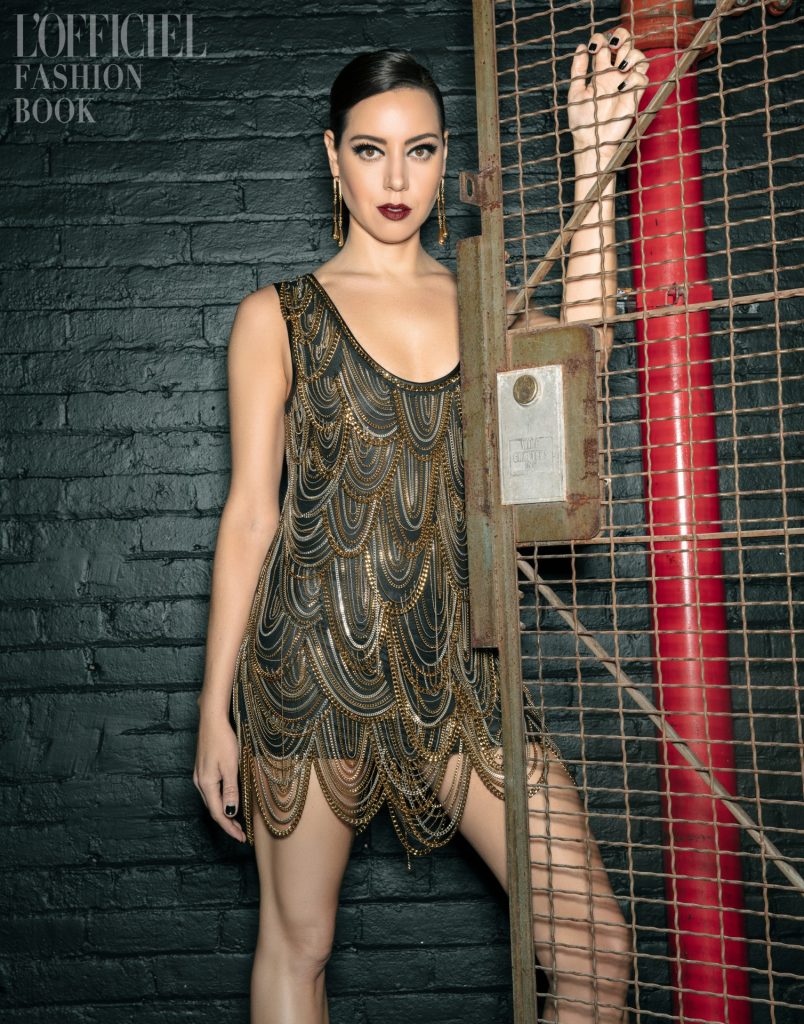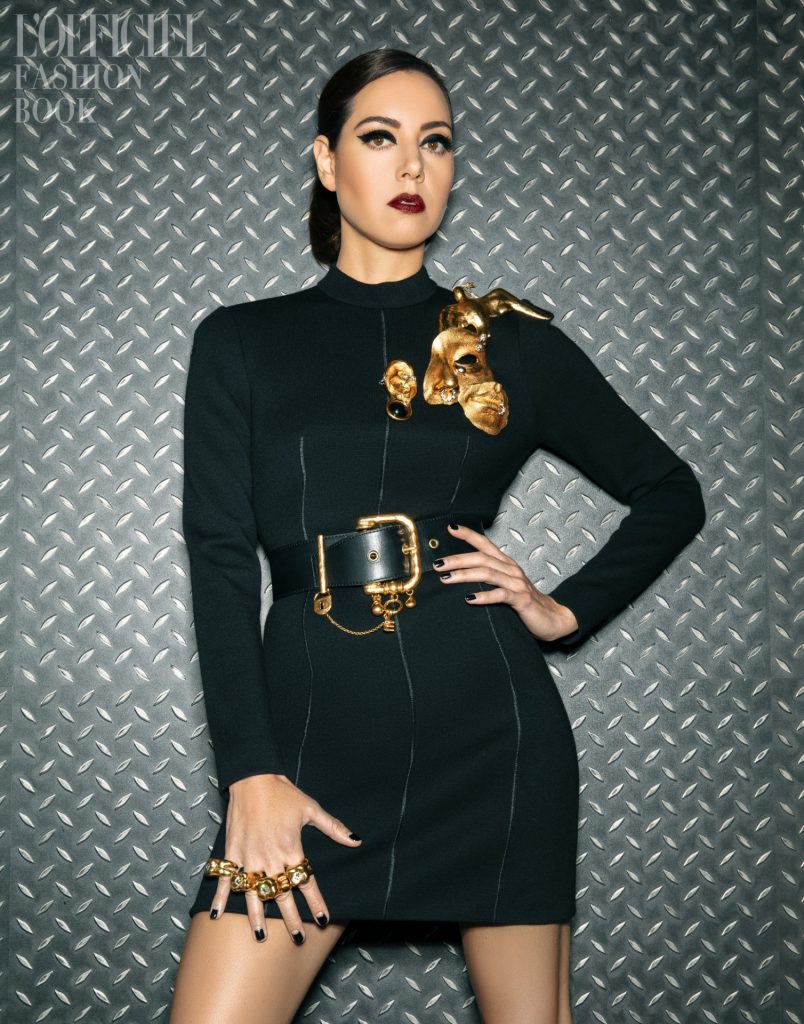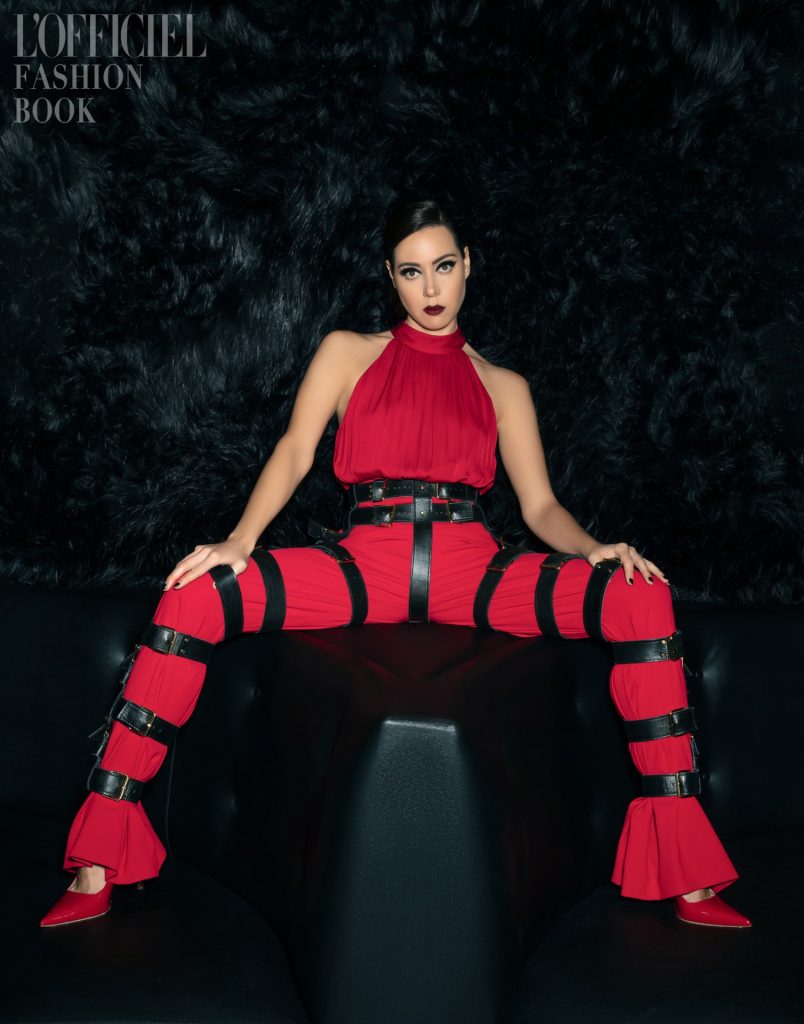Aubrey Plaza
“Emily the Criminal”
Photoshoot / Interview
photoshoot
Talent: Aubrey Plaza
Photography, Creative Direction, and Production by: Mike Ruiz
Editor-in-Chief: Dimitri Vorontsov
Fashion Editor/Stylist: Alison Hernon @718blonde
at Agency Gerard Artists @agencygerardartists2
Hair: Rheanne White @rheannewhite at Tracey Mattingly Agency @tracymattinglyagency
Makeup: Kathy Jeung @kathyjeung at Forward Artists @forwardartists using La Mer
Retouching: Darya Zagornaya @darya_dariart_retoucher
Styling Intern: Jessica Bally @jessica_bally, Sophia Renda @sophierenda,
Katherine Harbold @katieharbold
Studio: Hush Bar @hushhkbar
interview
by Dimitri Vorontsov
Dimitri: Congratulations on Emily the Criminal. When did you decide to become a producer on this project?
Aubrey: Basically, I was working on a documentary with these two producers, Kent Kubena and Angus Wall, they have this company. They’re brilliant producers. We were working this project, it had nothing to do with it. We loved working together. We were trying to find other stuff to do together, and then Kent said, “Oh, I just read this script randomly. It’s not a real movie or anything but you’ll probably like it. Here you go.”
I just picked it up. I wasn’t trying to find a project to produce. I just read it. I picked it up. It was such a fast read, like I read it so fast. My brain was just buzzing like, “Oh, I can totally see this film.” I love it, so I just asked him like, “Can I meet the writer?”
I sat down with John Ford, who obviously eventually ended up directing the film, but I didn’t know he was going to want to direct it. I thought he was just writing it. We sat down and we had coffee. I said, “I want to produce this. Shall we find a director?” then he said, “Well, I want to direct it.” He was a first-time director so I had a slight hesitation but I also felt like, “Actually, I think I believe in this guy. I’m confident about him. There’s something about him.”
We just decided, “All right, fuck it. We’re going to make it together.” Then we hit the ground, hit the pavement, trying to find money to make it. That’s really it. It was a random script that I read. I just fell in love with it. It was a couple of years ago so it’s been a long road to get that movie done but we finally did it.
Dimitri: It premiered at Sundance, is it correct?
Aubrey: It was great. Our reviews are incredible. I was blown away by the response. Sundance is virtual this year which was such a disappointment because we’re supposed to in-person, and then at the last minute, Sundance canceled the in-person festival so the entire festival was online.
It was really a bummer because I think the movie with an audience in a theater would have totally crushed it. It still translates at home so people loved it. Our reviews were amazing. I think it was refreshing because the movie is a throwback movie. It feels like how movies used to feel or something. There’s like a ’90s erotic thrilleresque vibe to it or something. It’s like there was no agenda. I think a lot of movies now, a lot of movies have some kind of political agenda or there’s some kind of other thing that people are trying to do. This movie was just purely entertainment.
Dimitri: John Ford, he’s written the screenplay and was the first-time director. Was a bit of nerve-racking for you because he was a first-time director or did you have any input? By the sounds of it, you pretty much made this project happen.
Aubrey: Well, I’m a very hands-on producer. I’m involved in every part of it. Even in the edit, I was there almost every day take by take, by shot. We really work together. I think that was one of the reasons why I really wanted not to— I believed in him for sure, but I think one thing that I have learned about first-time directors is a lot of times, in my opinion, I feel like the successful ones are the ones that really collaborate. They allow discussions and they don’t approach it like, “Oh, I know everything.” They’re more collaborative and open.
John was like that from the beginning. That made me feel like, “Okay, good. We’re going to be able to–” Because a lot of these movies, the small movies, when you don’t have a lot of money, you can’t always make what’s on the page exactly that come true. You have to be malleable and you have to allow things to evolve. Some people just can’t expand their minds and be open to that, and then they fuck themselves in the end because they’re just forcing whatever, a hole into a square or whatever that phrase is.
John wasn’t like that. He was really open. Also just his instincts about the film, he wrote it based on his own personal story. Obviously, the character is a woman, a female in the movie, but he really had that job and he really lived that— He didn’t do credit card scans and become a criminal, but he lives by— On the record, but no. He was just a struggling young up-and-comer. He moved to LA and he was working these catering jobs in downtown, and he was grinding it out. LA is a really, really hard place to survive when you have no money and not a lot of friends and you’re not from there. It’s a tough city to navigate. He was writing from his own personal experience. I felt like he should direct the movie because it’s his story to tell and it really informs a lot of it. He was so specific about so many things because he knew because he had done it.
Dimitri: Throughout the film, your character falls in love with Youcef. Was that the original part of the story?
Aubrey: I think that was one of the big reasons why I wanted to do the movie because I always want to do a love story and I just felt like this was an opportunity to do a love story disguised as a crime thriller. That part of it was always was what made me want to do the movie because I just love the idea. I didn’t see it coming.
When I read the script and you meet Youcef’s character, I never imagined, “Oh, they’re going to get together.” I just thought, “Oh, he’s going to be the crime boss and whatever,” but I never thought like, “Oh, they’re going to get together.” That took me by surprise and I liked that. That was important to me. I think it’s a love story. There’s something drawing them two together.
Dimitri: Did you guys reference to any films when your were creating your film?
Aubrey: John is a really big fan of Jacques Audiard. There’s a movie called The Beat That My Heart Skipped and that movie was a big reference for him. A lot of foreign films. We talked a lot about Head-On, which is Fatih Akın. And also the Safdie Brothers’ Good Time. That movie was a reference to just because there’s something about the momentum of those movies that they just barrel forward. You don’t stop. You start and you’re just off.
I think that’s how the scripts always read to me where it was were dropped into this interview. It’s already, we’re at an 11. It’s not normal movies where it’s a normal day and then you get fired and then you get broken up with, and now you got to figure out. It’s like, “No, she’s already had enough at the beginning.” Jacques Audiard was a big one, even in terms of how we shot it. More visually that movie was referenced, but energetically, I think the Safdie Brothers were a really good comp.
Also just in terms of the character, because just to use Good Time as an example, I don’t want to totally compare it to that movie, but it’s with male protagonists, a lot of times, there’s no apologies about the moral questionability of what these guys are doing and you’re along with them for the ride.
Robert Pattinson’s character in Good Time is despicable. In some way, it’s character, but you don’t really care. You just along with him for the ride. I find that there’s not many female characters that can do that because people normally want female characters to be likable, or there needs to be some moral thing going on with them or the audience will not like them and this didn’t have that. It was just unapologetic. It was that’s what I liked about it. It was like, “No, she’s just got to survive and do what she’s got to do.” Like it or not kind of thing. We don’t have to explain everything. Be in the moment.
Dimitri: You guys show really harsh reality of Los Angeles. It’s pretty brutal.
Aubrey: Yes, because I think a lot of movies, like independent films that are set in Los Angeles, they always show, like, this one side of LA where it’s like the East Side, Silver Lake, like hipster side of LA. Which is like more like– we show that in the movie. Her friend is navigating. You don’t get to see the real LA a lot. Downtown is such a strange– It’s such a strange area. Even just the driving stuff, like just constantly being in traffic on the 110, on the freeways and all of that stuff is so specific, and I feel like it’s so not represented normally on film. I loved the idea of doing something really gritty, like no makeup, just down and dirty stuff.
Dimitri: What’s the plan for this film? Is it going to be a theatrical release?
Aubrey: It’s coming out on August 12. In theaters. Roadside Attractions. Vertical Entertainment. They bought it at Sundance and they’re releasing it purely theatrical. We’re doing an old school.
Dimitri: Really. Just theatrical? No platforms? Wow.
Aubrey: No, I’m trying to keep the indie movie alive. I believe in the theatrical experience. I don’t believe that that’s going away. I think it’s so important. I really do. I don’t care if people think it’s stupid.
Dimitri: No, it’s true. You don’t get the same experience on your laptop or tv.
Aubrey: No, I don’t like the day and date mentality where they go, “Oh, it’s in theaters. You can buy it on–” whatever it’s like. No one’s going to go to the theater. Our movie is coming out in theaters. If you want to see it, you go to the theater and that’s it. Of course, with COVID, it’s like that’s the thing that can fuck it all up. I don’t know. Hopefully, we’ll be in a good space in August with COVID stuff. You can’t predict any of that.
Dimitri: Your other project, Operation Fortune that’s massive. It’s Guy Ritchie for crying out loud. It can’t get any cooler.
Aubrey: Me too dude, yes.
Dimitri: Tell me.
Aubrey: I was like, “If I’m going to be in an action movie, I want to be with Jason Statham and Guy Ritchie, that’s good for me.”
Dimitri: Just sprinkle some Hugh Grant as well just to add an extra–
Aubrey: We don’t have an asshole thrown in there.
Dimitri: Your character is quite fiery.
Aubrey: Tried to be.
Dimitri: You are the nicest person in the film.
Aubrey: Who are you talking about? I’m a delight.
Dimitri: Of course, you’re a delight and that’s why you keep repeating in the film that you’re a delight so everyone could believe that. Tell me how do you feel working with Guy Ritchie?
Aubrey: He was there? I can’t remember what— Did he show up? Maybe he was there for one day. I’m kidding, I’m kidding, I’m kidding. He’s not just a man, he’s a larger than life character. He’s ridiculous. What I liked about working with him was he has these moments on set, these moments where he lights up like a little kid or something and you can tell how excited he is by the process.
He doesn’t plan anything. The script is like a guideline. It’s barely a guideline. It’s a game for him. You show up and nobody knows what’s going to happen at any day because he changes everything every day. You show up and then he’ll summon you to his trailer and then everybody’s pitching jokes. It feels honestly like a sport working on one of his movies. It feels like a sport.
It’s athletic in nature, there’s winners and losers every day. For me, I was the only woman in the movie besides Lourdes who plays Hugh Grant’s assistant. That’s it, I’m the only female character so I’m surrounded by all these British guys. They’re all trying to one-up each other and they’re dick-contest or whatever they’re doing. I’m just trying to get my jokes in there. It was like I was one of the guys. I had to put that approach on and it was fun.
Guy’s insane, he would show up and be like, “Strawberry Aubrey,” which is what he would call me. “Strawberry Aubrey, how do you feel about singing a song today?” I’m like, “I don’t care. I’ll do whatever you want. You want me to sing a song, you want me to dance, what do you want me to do?”
He’ll be like, “No, you should sing a song today. Here’s a song and be ready in 20 minutes.” I’m like, “All right.” You just don’t know what you’re going to get with him but it’s never boring, that’s for sure. Because he’s friends with Statham, they’ve known each other forever—
Dimitri: Since the beginning, since the first film. Since the Lock, Stock and Two Smoking Barrels.
Aubrey: It was so fun to be around them because it’s like they’re a little like eight-year-old boys together. They’re living their best lives. In the script, my character is supposed to be Statham’s partner but I kept trying to infuse this love story, some kind of element of whatever I’m. They were not having it. The whole time they’d be like, “But Sarah and Orson they get together at the end.”
They’re like, “No.” I’m like, “Yes,” and they’re like, “No.” Every scene I’m basically harassing Jason. I’m just coming on to him in every scene. I remember one scene I slapped his ass really hard, at the end I whispered a line to him and then just really gave him a slap on the butt. Then Guy came up to me in the middle of the take and was like, “You know, Aubrey, I really liked how you slapped his ass and I’d like you to do that again.” I was like, “I will.”
Dimitri: Beautiful.
Aubrey: I felt like we really got each other. We had the same sense of humor. Also, he doesn’t work with a lot of Americans, I don’t think so it was interesting too to be an American. He would pitch me jokes and I’d be like, “I would never say that. That is the most British thing I’ve ever heard in my life. No, I’m not saying that.” It was just funny to me because I was like, “You’re so not.”
Aubrey: I know, it could have looked like so many places. It was beautiful.
Dimitri: Any funny jokes from that set because we’ll be here for an hour. Any crumpet jokes?
Aubrey: Crumpet jokes, really?
Dimitri: Crumpets, the British Muffin in the US. There’s even a joke like, that thing never toasts well. If there’s a fire in the house, you get under the fucking crumpet because it’ll never toasts.
Aubrey: That’s funny. No, no, I don’t have any. I can’t remember what happened, it was so long ago.
Dimitri: Can you tell us more about butt slapping Jason Statham?
Aubrey: That was a funny moment because normally in James Bond movies— This is not James Bond. Orson Fortune, there’s a clear— Normally, in those movies the Bond character is always mildly sexually harassing other women or being so overly flirtatious with the women. I was like I wanted Sarah Fidel to be a female bond, not like a Bond girl, like a female Bond. Where I was like, I’m an agent, but I’m also hitting on all the guys, and I’m just horny or something.
That was not in the script. I just added that because I thought that’s what a female Bond character would do. I would be trying to sleep with Orson Fortune every night, and I’m going like, “Hello. You don’t want me? You’re more interested in what? Come on.” We’ll save that for the sequel.
Dimitri: They still haven’t cast the new Bond, you could be really good.
Aubrey: I know. We need a female Bond. I thought that was funny, and I think that was— I think in my opinion, Guy Ritchie’s sense of humor historically, it’s a male— I don’t know what the word is. It’s more male-dominated and machismo, the world in which he navigates, and so it was interesting to find a way for our stuff to come together. I just think like it worked out. Because I think I have like the same kind of humour, but it’s in a different way or something.
He just thought it was hilarious how much I was like just harassing Jason all the time. I would try to kiss him like, I’d be like, this is the scene at the end of the movie where we got the bad guys, and we had the briefcase, and he gets in the car, and I’m still flirting with him, and then I like go in to try to kiss him, and he’s like, “No. No.” I’m like, “What the fuck? You think I’m ugly or something?”
Dimitri: The third film that I’ve watched with you in the last little while of course is Spin Me Round.
Aubrey: That also comes out in August, and that comes out I think on streaming and in theatres, so I I will have two movies in the theatres in August.
Dimitri: In Spin Me Around, the ending is pretty out there. I wasn’t expecting that kind of ending for this type of film. What attracted you to Spin Me Round?
Aubrey: My husband directed it. The first movie I ever produced was a movie that my husband directed called The Little Hours. If you haven’t seen it, you should check it out. Because it’s really, really good and funny, and we shot it in Italy a couple of years ago. We love shooting in Italy, and so he was trying to figure out another idea that would bring us back to Italy to shoot.
I know. That was where it started that idea, and then obviously it evolved and all these things, and then he started collaborating with Alison. Alison was also in The Little Hours. Jeff likes to work with the same people, so he has his cast of actors that he likes, and then everyone like does all the movies with him. This was like an idea that he had for a while, and he finally just got it done, and I, of course, am in the film.
Dimitri: Basically, you’re just trying to find projects so you can just move to Italy. That’s the whole plan?
Aubrey: Look, I didn’t have to be in Italy for White Lotus, that was a fucking coincidence, all right?
Dimitri: [laughs]
Aubrey: I don’t know how I’m back. I’m meant to be here. I don’t think I’m supposed to leave. I can’t stop working in Italy. I don’t know why. It’s not my fault.
Dimitri: But you like it.
Aubrey: I love it.
Dimitri: If you could give your younger self advice, what sort of advice would you give yourself?
Aubrey: Direct a movie now. Don’t wait until you’re in your late 30s. Direct it now. Say, “Fuck it.” Just make it. Direct it. That’s the one thing I would say to myself. Why are you waiting so long to direct? What’s wrong with you? Do it now. There’s nothing I can do about it.
Dimitri: You’re just giving advice to yourself now–
Aubrey: I am going to do it now, but I wish I had done it younger.I would have been so precious about it, because I love movies. If I think about if I’m going to direct a movie, if I make a movie that stinks, I’ll die. I’ll just implode. It means so much to me.
Dimitri: You should do it then.
Aubrey: That’s what I’m saying. I need to say to my younger self like, “Don’t think like that. Don’t be so precious about it. Just do it. Just make it.”
Dimitri: Amazing.
Aubrey: I’m going to direct a movie next year.
Dimitri: Really?
Aubrey: Yes.
Dimitri: Have you found the project yet?
Aubrey: Yes. I’ve written it. I’ve been writing it for years.
Dimitri: You’ve been writing it. You’re going to be a writer-director?
Aubrey: Fuck yes.
